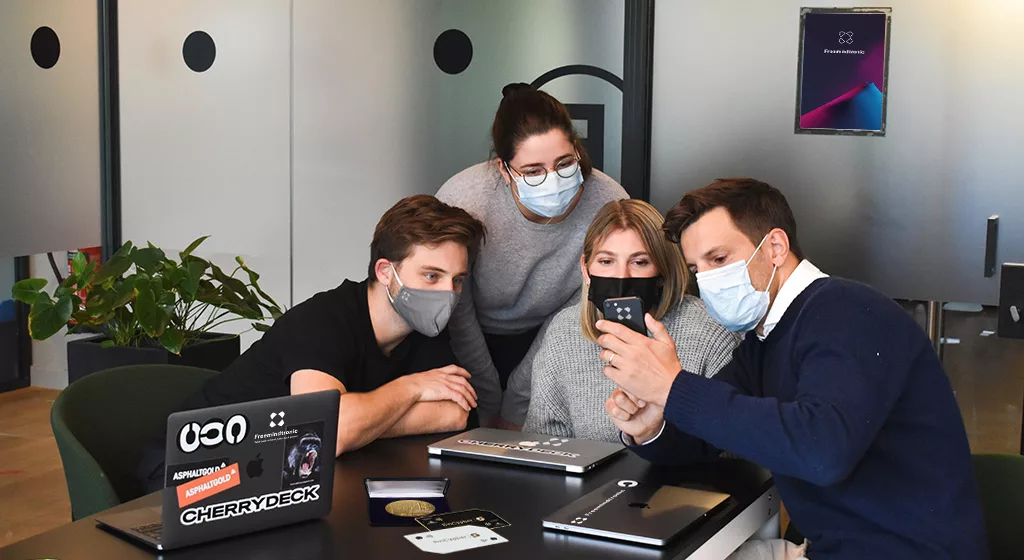Articles
Mobility & Telecommuting: How to create a contactless cybersecure computer workstation?
How to create a contactless cybersecure computer workstation with Freemindtronic Andorra’s NFC devices.
The risk of contamination from Coronavirus COVID-19 has led to increased use of telework. The pandemic quickly imposed global containment of people. Independents, businesses, associations, administrations and communities have had to do everything possible to create jobs in a mobility environment. Unfortunately, this has not always been possible. It has become vital to preserve at least essential professional activities.
For some, the use of telework may seem temporary. However, the use of this mode of operation could well take hold in the long term, and surely become a norm in the future, beyond the duration of this health crisis.
Businesses will have reorganized around this new mode of operation and the new constraints associated with the limitation of travel.
More than a trend, it is a finding according to the survey conducted by Gartner which indicates that 88% of organizations have encouraged, or obliged, the use of telework. (https://www.gartner.com/en/newsroom/press-releases/2020-03-19-gartner-hr-survey-reveals-88–of-organizations-have-e)
According to the French Ministry of Labour, more than 4 out of 10 jobs in the private sector are now compatible with telework. According to a survey conducted by Deskeo among 2,915 professionals spread throughout France 62% of respondents will want to do more telework after confinement. (https://www.ledauphine.com/magazine-lifestyle/2020/04/24/les-francais-voudront-faire-plus-de-teletravail-apres-le-confinement).
A lot of organizations that have had to telework are done urgently. Some were put in place “remotely” with confined employees and without control of the security measures to be implemented. They have an obligation to find solutions to adequately protect information systems.
More worryingly, in an emergency, it was not possible for companies to deploy the necessary means and equipment to implement this new mode of operation. In fact, telework is often carried out with the personal equipment of employees with a level of safety not in accordance with professional use. This increases the area of exposure to vulnerability to data security and integrity.
Cyber criminals take advantage of telework vulnerability
Cyber criminals, on the other hand, have properly assessed this situation. They have seen exceptional potential and are taking advantage of this windfall to increase and target their cyberattacks.
A very worrying, dual-effect situation related to the containment and return of people to the company with their data exposed to risks.
@INTERPOL states that “Cybercriminals are attacking the computer networks and systems of individuals, businesses and even global organizations at a time when cyber defences could be reduced as a result of refocusing attention on the health crisis at COVID-19.” (https://www.interpol.int/Crimes/Cybercrime/COVID-19-cyberthreats)
Recommendations from Interpol and ANSSI
Interpol’s first recommendation is to back up all important files and store them independently of your computer system (e.g. in the cloud or on an external disk). Their second recommendation is to always check that you are on a company’s legitimate website before entering login information or sensitive information. When it comes to prevention, Interpol advises updating your passwords and making sure they are strong enough with a mix of capital letters, lower cases, numbers and special characters.
@ANSSI published its Computer Security Recommendations for Telework in Crisis on 23 March 2020. ( (https://www.cybermalveillance.gouv.fr/tous-nos-contenus/actualites/recommandations-securite-informatique-teletravail))
Their first recommendation “Separate professional and personal practices well at the risk of confusing them and generating security errors that could be detrimental to his business.” Second, “Strictly apply the safety instructions of your business.” Other common recommendations follow, such as “Strengthen password security” and “Save your work regularly,” including on media outside your equipment (key or USB drive) that you unplug once you’ve backed up.”
In France, Prime Minister Édouard Philippe called “emphatically” on all French companies to maintain telework as much as possible for their employees.
Minister of Labour @MurielPénicaud recommends the use of telework until the summer
“… 5 million French people are now teleworking, and in the context of progressive deconfining, it is important that they continue to telework…”
Innovative backup solutions on fixed and removable media that self-disconnect
There are two secure contactless products that originally have a physical self-disconnection system from computer systems when backup is made. These are the NFC hardened USB stick EviKey and the Sata III EviDisk SSD disc available in the USB 3.0 external case and the internal 7mm 2.5″ format. Products developed by Andorran Freemindtronic SL.
Check out the demo in the video below the contactless unlocking of an EviDisk built into a company’s KUBB computer Bleujour.
During the Occitanie CyberMatines on LMI TV @lemondeinformatique april 22, 2020, Fullsecure conducted offline protection and physical use demonstrations of sensitive data such as passwords and encryption keys. The backup media in credit card or Tag formats operate without contact with a phone serving as an NFC terminal.
This demo shows an electronic self-connection system to a computer, a motherboard Bios, a Windows session and a VPN.
Retrocompatible solutions for offline encryption of any type of data on computer and phone
Another demo shows how to encrypt any data on computer and smartphone, an operation compatible with all computer systems and messaging services, including SMS.
We are talking about compatible retro solutions that offer the advantage of securing the use of any type of computer hardware, computer, smartphone, software, application while maintaining maximum security of the use of sensitive data, whether personal or professional.
Finally, Fullsecure gives a tip to make a desktop “smart”: Secure the sensitive data of any computer discreetly, discreetly, thanks to its mini devices hardened in Pin’s format.
In addition, data sharing is contactless, reducing the risk of contagion during this period of pandemic due to Covid19. Indeed, it is enough to approach your smartphone to the Fullsecure device to manage and use the data contained in pin’s.
Fullsecure offers a wide range of products to meet data security needs in mobility and/or in the workplace.
Learn more about Fullsecure products https://fullsecure.link
